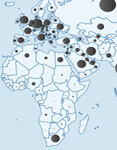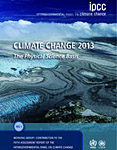Global Carbon Project - Wikipedia, the free encyclopedia

The Global Carbon ProjectThe Global Carbon Project (GCP) was established in 2001 in recognition of the large scientific challenges and critical nature of the carbon cycle for Earth's sustainability.The scientific goal of the project is to develop a complete picture of the global carbon cycle, including both its biophysical and human dimensions together with the interactions and feedbacks between them.
|
GCP : Global Carbon Project : Homepage
The WMN carried the latest report from the Project:
It's time for a revolution in attitude to CO2 emission
| Posted: October 23, 2014

Global CO2 emissions are set to rise by 2.5% over the next year, but according to scientists at the University of Exeter they need to drop by 5% a year over the next few decades to avoid damaging the climate
Comments (0)
Carbon emissions are expected to reach record highs in 2014, researchers have revealed, prompting concerns that time is running out to hit crucial climate change targets.
Scientists from the Global Carbon Project (GCP), which is co-led in the UK by researchers at the University of Exeter and the University of East Anglia, have announced that world CO2 emissions are set to rise to 40 billion tonnes over the next year. This marks a global increase of 2.5% and GCP members have warned that if the current emission rates are maintained, international communities risk losing their opportunity to keep average global warming under 2C “in just one generation”.
Professor Corinne Le Quéré, director of the Tyndall Centre for Climate Change Research at East Anglia, said: “The human influence on climate change is clear. We need substantial and sustained reductions in CO2 emissions from burning fossil fuels if we are to limit global climate change. We are nowhere near the commitments necessary to stay below 2C of climate change, a level that will be already challenging to manage for most countries around the world, even for rich nations.”
The GCP’s latest estimates suggest that total future CO2 emissions should not exceed 1,200 billion tonnes if chances of keeping within the 2C limit are to remain “likely”. But at current rates, the 1,200 billion quota could be used up in around 30 years.
Exeter University’s Professor Pierre Friedlingstein, said global emissions would have to be reduced by more than 5% each year over the next few decades to have any hope of avoiding the 2C rise. He added that one way to avoid breaching the quota would be to leave half of all fossil fuel reserves untapped. “The remaining fossil fuel reserves equate to roughly double the quota,” he said. “If we had ways of storing carbon in the ground, obviously you could use more of these resources, but we don’t have the technology at the moment.”
Teams led by Professor Friedlingstein and Professor Le Quéré published their most recent findings in Nature Geoscience and Earth System Science Data Discussions journals in advance of the UN climate summit in New York this week. The researchers took the opportunity to call on politicians to take more urgent action on the issue.
“The time for a quiet evolution in our attitudes towards climate change is now over,” Professor Friedlingstein said. “Delaying action is not an option – we need to act together, and act quickly, if we are to stand a chance of avoiding climate change not long into the future, but within many of our own lifetimes. We have already used two-thirds of the total amount of carbon we can burn, in order to keep warming below the crucial 2C level. The implication of no immediate action is worryingly clear.”
It's time for a revolution in attitude to CO2 emission | Western Morning News
Meanwhile, Prof Friedlingstein has been bestowed with a Royal Society Wolfson Research Merit Award, making him one of just 14 scientists nationwide to be awarded the honour, in recognition of his outstanding research entitled Earth System biogeochemical feedbacks, climate targets and emissions mitigation.
Leading Exeter climate scientist honoured | The Exeter Daily Leading Exeter climate scientist honoured
.
.
.







No comments:
Post a Comment